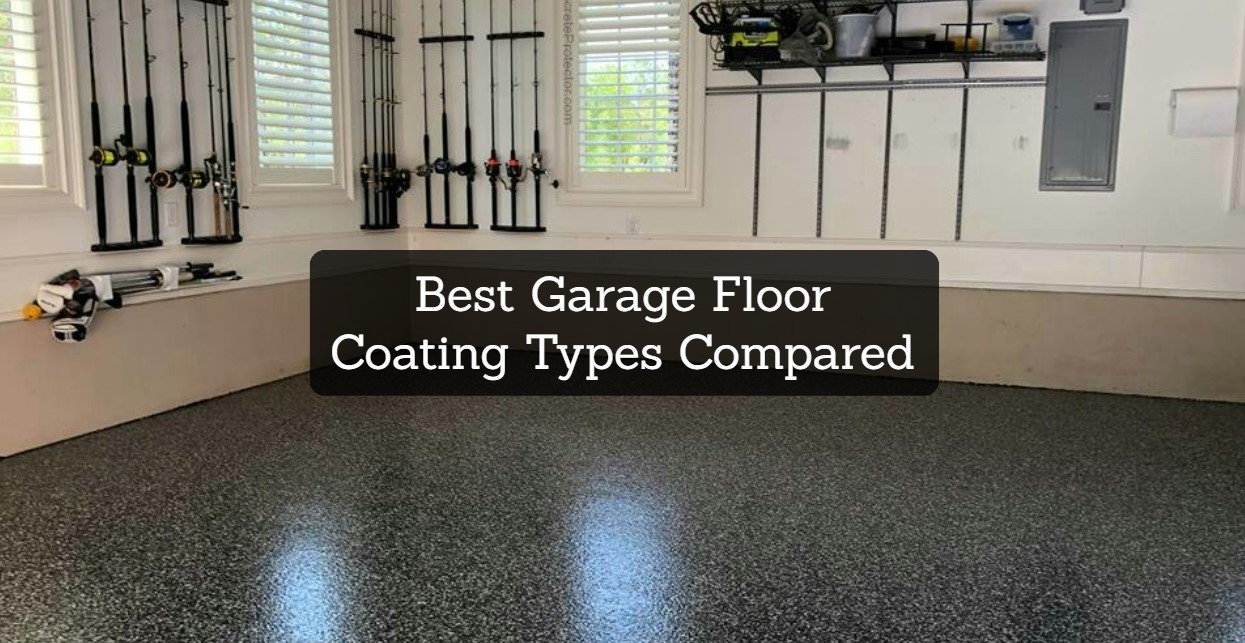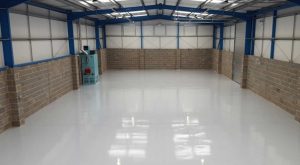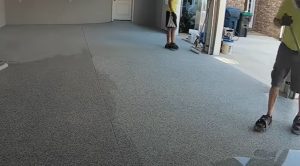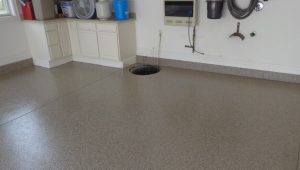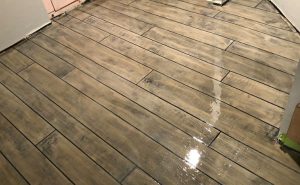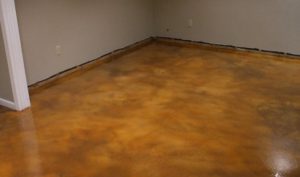The garage floor takes a beating. From harsh chemicals and oil spills to heavy tools and constant traffic, it needs a tough surface that can withstand the abuse. But with so many garage floor coating options available, choosing the right one can be overwhelming. Also, the article Types of Garages will help you choose the right flooring.
Worry not, fellow DIYers and car enthusiasts! This guide dives into the five best garage floor coating types, comparing their pros, cons, and ideal applications to help you find the perfect match for your needs and budget.
1. Epoxy: The King of Durability
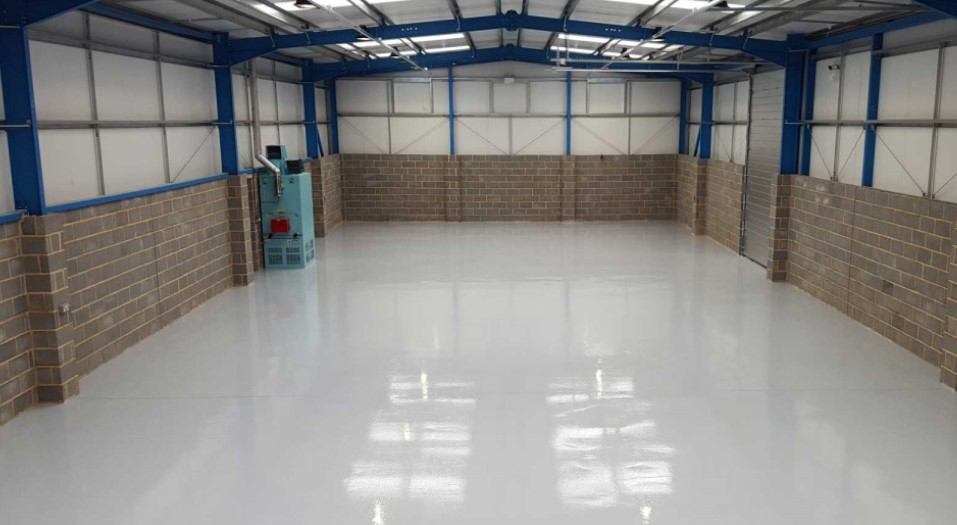
Epoxy reigns supreme in terms of durability and chemical resistance. This two-part resin system creates a rock-hard, high-gloss finish that’s impervious to oil, grease, and most solvents. It’s also scratch and stain-resistant, making it ideal for busy garages with heavy tools and messy hobbies.
Pros:
- Extremely durable and long-lasting: Epoxy flooring can last for 15-20 years with proper care, making it a worthwhile investment for any garage floor
- Chemical and stain resistant: Epoxy is impervious to oil, grease, gasoline, and most other chemicals, making it perfect for messy garages.
- Easy to clean and maintain: Epoxy floors are smooth and non-porous, making them easy to sweep, mop, or pressure wash.
- Available in various colors and finishes: You can choose from a wide variety of colors and finishes to create a customized look for your garage.
- Adds value to your home: A well-maintained epoxy floor can increase the resale value of your home.
Cons:
- Requires meticulous surface preparation: The concrete floor must be perfectly clean and dry before applying epoxy, which can be a time-consuming process.
- Can be challenging to apply DIY: Epoxy is a two-part resin that must be mixed and applied correctly to avoid problems. It’s often best to hire a professional installer.
- Strong fumes during application: Epoxy emits strong fumes during application, so it’s important to ventilate the garage well and wear a respirator.
- More expensive than other options: Epoxy flooring is more expensive than other garage floor coating options, such as paint or sealers.
- Slippery when wet: Epoxy floors can be slippery when wet, especially if they don’t have a textured finish.
Overall, epoxy flooring is a great choice for garages that need a durable, chemical-resistant, and easy-to-clean surface. However, it’s important to be aware of the challenges of installation and the higher cost before deciding.
Ideal for: Garages with heavy traffic, chemical exposure, and a need for a high-gloss, professional finish.
You may also like: Types of Garage Flooring
2. Polyurea: The Speedy Solution
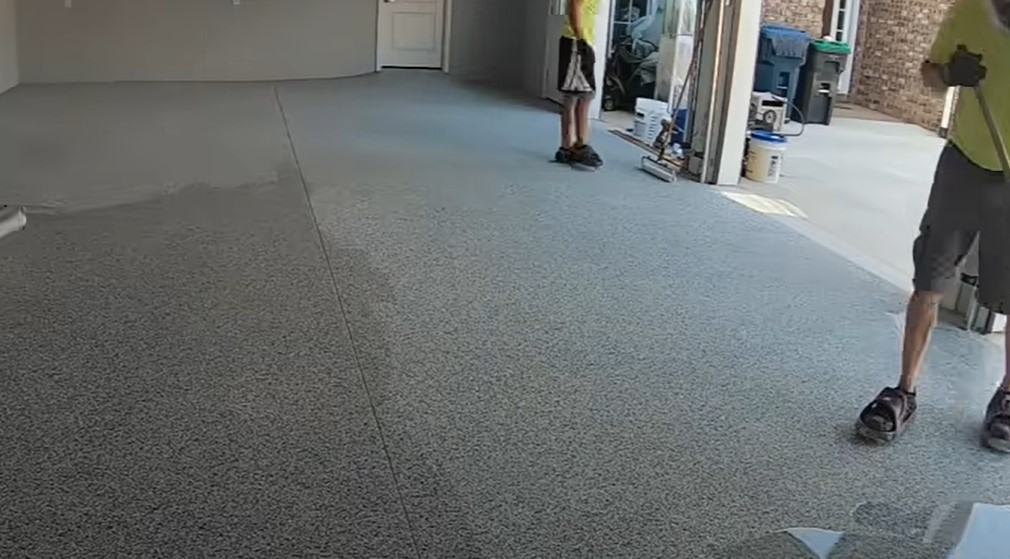
Polyurea shines as a superior alternative to epoxy when it comes to speed and resilience. Imagine the convenience of coating your garage floor and having it ready to use in just a few hours! But before you jump in, let’s delve deeper into the pros and cons of this speedy solution:
Pros:
- Blazing-fast curing time: Unlike epoxy’s 24-hour curing window, polyurea dries rock-hard within 2-4 hours, minimizing downtime and letting you reclaim your garage floor quickly
- Exceptional durability and longevity: Despite its quick application, polyurea boasts a lifespan comparable to epoxy, lasting up to 15 years with proper care.
- Impervious to chemicals and stains: Similar to epoxy, polyurea stands strong against oil, grease, and harsh chemicals, making it ideal for messy garage activities.
- UV and temperature resistance: Unlike epoxy, polyurea thrives in harsh environments. It resists harmful UV rays that cause yellowing and remains unfazed by extreme temperatures, perfect for garages in hot climates or with significant sun exposure.
- Abrasion and impact-resistant: Polyurea’s tough composition withstands scratches, scuffs, and even dropped tools, keeping your garage floor pristine for years.
Cons:
- Professional installation required: Unlike DIY-friendly epoxy, polyurea’s rapid curing and specialized application techniques demand professional expertise. Expect to hire trained applicators.
- Higher cost than epoxy and other options: The speed and performance of polyurea come at a premium. Be prepared for a larger investment compared to epoxy or budget-friendly alternatives like paint.
- Strong odor during application: Similar to epoxy, polyurea emits potent fumes during the application process. Proper ventilation and respiratory protection are crucial.
- Limited DIY options: The fast curing time and specialized equipment make DIY application nearly impossible for most homeowners.
Overall, polyurea is a game-changer for garages that prioritize speed, durability, and resilience, especially in challenging environments. While the professional installation and higher cost might be deterrents, the convenience, and long-lasting performance make it a worthwhile investment for garages that see heavy use or experience extreme weather conditions.
Ideal for: Garages needing a fast turnaround, exposure to harsh elements, and a high-performance, durable finish.
You may also like: Best Garage Floor Drain Systems to Buy
3. Polyaspartic: The Ultimate Upgrade
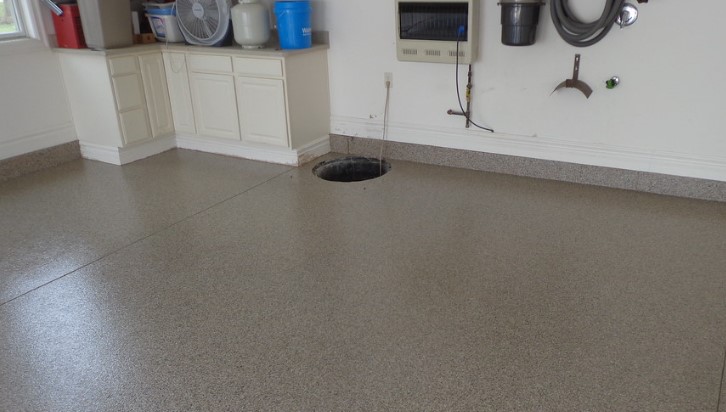
Polyaspartic reigns supreme in the garage floor coating arena, combining the best features of epoxy and polyurea to deliver unmatched performance. It’s not just the top dog; it’s the whole pack in one powerful coating. Let’s delve into the details of its pros and cons to see if it truly deserves the throne:
Pros:
- Unsurpassed durability: Polyaspartic laughs in the face of wear and tear. Its rock-hard surface shrugs off scratches, impacts, and abrasion, lasting an impressive 20-25 years with proper care. Think dropped tools, heavy vehicles, and spilled chemicals – polyaspartic won’t even flinch.
- Impervious to chemicals and stains: No matter what your messy hobbies involve, polyaspartic has your back. Oil, grease, solvents, and even acids simply bead up and roll off its surface, making it ideal for workshops, garages with automotive work, or any space prone to chemical spills.
- High-gloss beauty: Prepare to be dazzled. Polyaspartic delivers a mirror-like shine that elevates any garage from utilitarian to stunning. Imagine sunlight bouncing off your floor and creating a polished, professional atmosphere.
- UV-resistant champion: Unlike regular epoxy, polyaspartic won’t succumb to the sun’s harsh rays. Say goodbye to yellowing or fading! This makes it perfect for hot climates or garages with significant sunlight exposure.
- Faster curing than epoxy: While not as speedy as its polyurea cousin, polyaspartic still boasts a quicker curing time than traditional epoxy (4-6 hours). This means you’ll be back to using your garage sooner than you think.
Cons:
- The heftiest price tag: This crown jewel comes at a cost. Polyaspartic is the most expensive garage floor coating option, significantly exceeding the price of epoxy or acrylic paint. Be prepared to shell out a premium for its performance.
- Professional installation only: DIYers, step aside. Applying polyaspartic requires specialized equipment and expertise, making professional installation mandatory. Expect to involve trained contractors, further adding to the overall cost.
- Strong fumes during application: Like epoxy and polyurea, polyaspartic emits potent fumes. Proper ventilation and respiratory protection are crucial, and temporary relocation might be necessary.
- Limited DIY repair options: Minor chips or scratches? You’ll likely need to call in the pros for touch-ups. The specialized nature of polyaspartic makes DIY repairs challenging.
Overall, polyaspartic is the undisputed champion of garage floor coatings. Its exceptional durability, chemical resistance, UV stability, and stunning high-gloss finish are unmatched. However, its hefty price tag, professional installation requirement, and limited DIY repair options make it a premium choice for garages that demand the absolute best, regardless of cost.
Ideal for: Garages demanding the absolute best in performance, durability, and aesthetics, especially in hot climates or with direct sunlight exposure.
You may also like: Free Garage Costs Calculators
4. Acrylic Paint: The Budget-Friendly Option
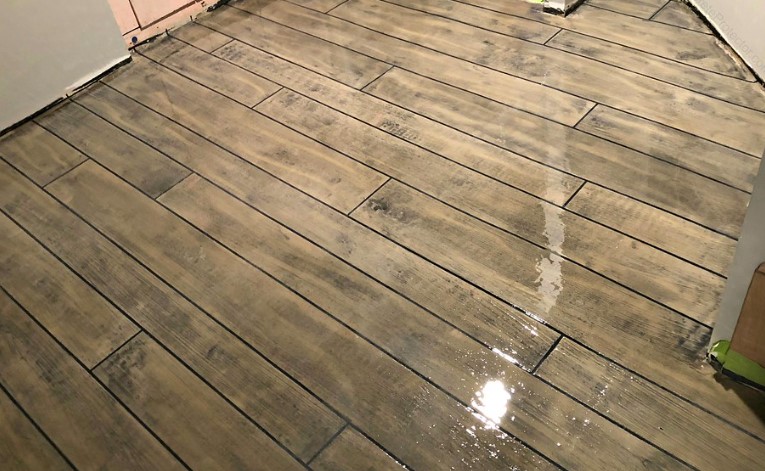
Acrylic paint might not be the ultimate garage floor warrior, but for budget-minded DIYers seeking a simple refresh, it holds its charm. Let’s explore the pros and cons of this affordable option in detail:
Pros:
- Budget-friendly: Compared to heavy-duty options like epoxy or polyurea, acrylic paint is significantly cheaper, making it an attractive choice for tight budgets.
- Easy DIY application: Unlike the specialized techniques and equipment required for other coatings, acrylic paint can be applied by most homeowners with basic painting skills and tools. You don’t need professional help, saving you additional costs.
- Quick drying: Say goodbye to lengthy curing times! Acrylic paint dries quickly, typically within 2-4 hours, allowing you to reclaim your garage floor swiftly.
- Available in a rainbow of colors and finishes: Don’t settle for dullness! Acrylic paint comes in a vast array of colors and finishes, from classic hues to bold accents and even textured options, letting you personalize your garage space.
- Easy touch-ups: Minor chips or scratches? No problem! Acrylic paint allows for easy touch-ups, keeping your garage floor looking fresh without major overhauls.
Cons:
- Not as durable as other options: Compared to its tough competitors, acrylic paint is much less resilient. It’s prone to chipping, scratching, and wear and tear under heavy traffic or exposure to harsh chemicals.
- Limited chemical resistance: While it provides some protection against spills and stains, acrylic paint isn’t impervious to harsh chemicals like oil, grease, or solvents. Expect moderate resistance at best.
- May require frequent recoating: The lower durability translates to a shorter lifespan. Depending on usage and traffic, you might need to repaint your garage floor more often than you would with a more robust coating.
- Slippery when wet: Similar to many smooth surfaces, acrylic paint can become slippery when wet, posing a safety concern. Consider opting for textured finishes or additional anti-slip measures.
- Not ideal for heavy traffic or messy environments: If your garage sees regular car parking, tool work, or other messy activities, acrylic paint might not hold up over time. It’s more suited for light to moderate use.
Overall, acrylic paint is a perfectly viable option for garages with light use and a budget-conscious mindset. Its ease of application, affordability, and versatility make it an attractive choice for DIYers or those seeking a temporary solution before upgrading to a more durable coating. However, remember its limitations. If your garage endures heavy traffic, chemical exposure, or needs maximum durability, acrylic paint might not be the optimal choice.
Ideal for: Garages with light traffic and a limited budget, or as a temporary solution before upgrading to a more durable coating.
You may also like: Best Garage Brooms for All Floor Types
5. Concrete Stain: The Natural Look
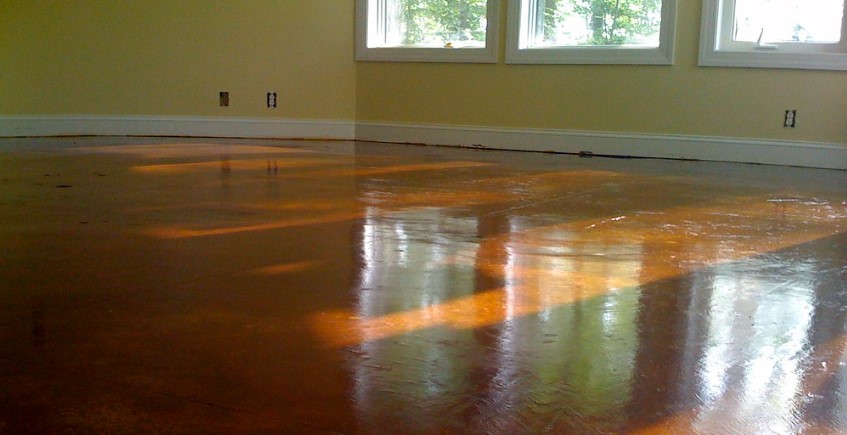
For those seeking a unique, natural aesthetic in their garage, concrete stain offers an alternative to the typical painted or coated floor. Unlike its counterparts, it doesn’t mask the concrete but enhances its character, creating a raw, industrial ambiance. However, before stepping into this world of earthy tones, let’s explore the pros and cons of concrete stains:
Pros:
- Natural, industrial look: Concrete stain enhances the inherent beauty of the concrete, revealing its unique grain patterns and imperfections. This creates a distinctive, raw aesthetic that complements vintage, modern, or minimalist garage styles.
- Wide variety of colors: Gone are the days of boring grey! Concrete stains come in a vast spectrum of colors, from earthy browns and greys to vibrant reds and blues. You can customize your garage floor to create a truly unique and personalized space.
- Penetrates the concrete: Unlike paint or coatings that sit on top of the surface, concrete stain penetrates the concrete, becoming a permanent part of the floor. This provides superior durability and resistance to peeling or chipping.
- Relatively affordable: Compared to epoxy, polyurea, or even high-quality acrylic paint, concrete stain is a more budget-friendly option. This makes it an attractive choice for those conscious of costs.
- Easy to apply: While professional application is always recommended for optimal results, DIY options for concrete stains are readily available. With proper preparation and technique, even homeowners can achieve a beautiful stained finish.
Cons:
- Not as durable as other options: While concrete stain offers improved resistance compared to paints, it doesn’t match the bulletproof toughness of epoxy or polyurea. Expect scratches, scuffs, and minor abrasions over time, especially in high-traffic garages.
- Limited chemical resistance: Concrete stain provides moderate protection against oil, grease, and mild chemicals. However, exposure to harsh chemicals or solvents can cause damage or discoloration.
- Highlights imperfections: Concrete stain can accentuate cracks, unevenness, or existing flaws in the concrete floor. Proper surface preparation before staining is crucial to achieving a smooth and flawless finish.
- Less variety in finishes: Unlike paint or coatings, which offer matte, glossy, or textured finishes, concrete stains mostly provide a semi-gloss or natural finish. The focus is on enhancing the concrete’s texture rather than adding additional textures.
- May require specialized cleaning: While generally easy to maintain, certain stains might require specific cleaning products or techniques to avoid damage. Research the proper cleaning methods for your chosen stain type.
Overall, concrete stain is a fantastic option for garage owners seeking a unique, natural look and are willing to embrace the raw beauty of the concrete. Its affordability, variety of colors, and ease of application make it a compelling choice. However, remember its limitations in terms of durability, chemical resistance, and highlighting imperfections. If your garage demands maximum toughness or a specific finish, other options might be more suitable.
Ideal for: Garages with light to moderate traffic and a desire for a natural, unique aesthetic.

